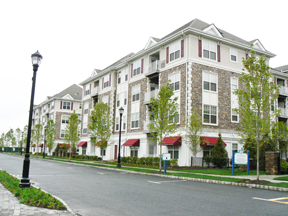A non-profit advocacy group wants to force a local developer to comply with the state’s updated affordable housing requirements.
The Fair Share Housing Center, a nonprofit affordable housing advocacy organization, filed a motion last month to force Fraternity Meadows to comply with new affordable housing quotas that were created in 2008. Fraternity Meadows is developing Xchange at Secaucus Junction, a 2,035-unit housing complex in the south end of town.
Fraternity Meadows and the town of Secaucus have argued that the development should comply with the rules that were in effect when the development was proposed, rather than the new state rules requiring more affordable housing.
The state Council on Affordable Housing (COAH) sets minimum affordable housing quotas for municipalities and periodically updates its formula for how those quotas should be met. COAH most recently updated its formula last June.
Statewide, COAH wants to see 115,000 new affordable housing units built by 2018. Under the new guidelines, known as Round III, municipalities are responsible for ensuring that developers construct one unit of affordable housing for every four units of market-rate housing. COAH guidelines also call for the construction of one affordable housing unit for every 16 jobs created within a municipality, and they increased the percentage of housing units that must be affordable in a development from 11 percent to 20 percent.
The state defines affordable housing as units that are sold or rented at below-market rates to people whose income meets regional guidelines established by COAH.
If the new rules are applied to Xchange, the number of affordable units in the development will jump from 230 – the number currently planned – to 415.
Secaucus and Fraternity Meadows filed legal papers in the fall to keep the number of affordable units at 230.
But Fair Share believes Fraternity Meadows and Secaucus are merely trying to skirt the law.
“Instead of preparing a plan that complies with COAH, they’re asking for special treatment,” said Fair Share Staff Attorney Kevin Walsh.
The matter is now in Trenton before COAH.
Numbers game
Four years ago, before the current COAH rules were adopted, Fraternity Meadows and Secaucus agreed that the developer could build 2,035 total units, including 1,805 market-rate apartments and 230 affordable housing units.
The New Jersey Meadowlands Commission (NJMC), which has zoning jurisdiction over 88 percent of the land in Secaucus, also participated in these negotiations.
Under the original plan for Xchange, the complex will be built in stages. The first phase was completed a year ago.
“When this project was first proposed, [the developers, the NJMC], and the town agreed that the best way to go about the project was to submit the overall plan, and have it approved even though it would be built in phases,” said Town Administrator David Drumeler.
The idea was to build one phase of the development, then study the regional impact on schools and other municipal services.
This impact study would enable the town to estimate the future impact the housing development would have on Secaucus when finished. Assuming the impacts are in line with the developer’s projections, then the NJMC would issue a certificate of occupancy for the next phase of development.
Construction at Xchange proceeded as planned. Sixty-four affordable units were rented out last year after 613 applicants from Northern New Jersey participated in a lottery and screening process.
Cut fees?
Then the rules changed.
“The [NJMC] adopted the rule that if you don’t have a certificate of occupancy, and haven’t already started construction, you must now be subjected to Round III COAH rules,” Drumeler said.
The new rules would increase Xchange’s affordable housing quota by an additional 185 units. Arguing that this isn’t economically feasible, Secaucus and Fraternity Meadows want Xchange to be exempted from Round III.
But Walsh said that the town should make it easier financially for Fraternity Meadows to build more.
Fair Share wrote, “Secaucus…has not taken any steps to reduce costs or provide any public subsidies to make the project financially feasible, which is what it is required to do under [state law].”
Walsh said the town should reduce various fees that have been imposed on the developer, most notably the $5 million impact fee, which is being used to pay for the new Recreation Center. Walsh claims such impact fees are rarely charged by municipalities. Off-site sewer improvements (totaling $1.6 million), sewer connection fees ($6.7 million), off-site road improvements ($2 million), and on-site infrastructure costs ($4.5 million) are other development fees Walsh believes are ripe for reductions. If cutting these fees isn’t possible, Walsh believes Secaucus should be open to the possibility of using municipal development fees or offering tax abatements to Fraternity Meadows.
The town stands by the arguments laid out in its motion.
“We all came to an agreement as to what this project was going to look like before Round III was adopted. And we all signed contracts,” Drumeler said. “Now people are changing the rules.”
Resident tried to get in
Meanwhile, as the various parties bicker about where to draw the line, low-income families struggle to make ends meet.
“I applied to get in [Xchange], but they turned me down,” a Clarendon Street resident said in December. “I’m mad. I don’t know a single person from Secaucus that got in there…I can hardly pay my rent now.”
Walsh said Secaucus’ image of itself as a well-to-do town isn’t consistent with the lives of many residents.
“The reality is, there are lower income residents in Secaucus, many of them employed by the town itself,” Walsh said. “One analysis we did shows that 60 percent of municipal employees in New Jersey qualify for affordable housing. This is not a question of ‘us’ versus ‘them.’ It’s a question of how does a municipality, and the state, create housing opportunities for everyone?”
E-mail E. Assata Wright at awright@hudsonreporter.com.
